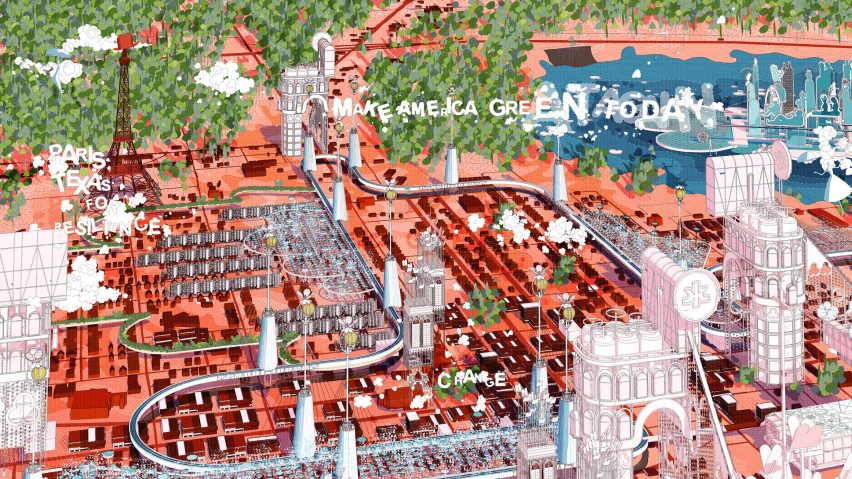Bartlett graduate Vilius Vizgaudis has reimagined Paris, Texas, as a sustainable city in a bid to entice president Donald Trump to rejoin the Paris Agreement.
Named The Gift, the conceptual masterplan proposes transforming the city of Paris in Texas into an eco-friendly metropolis based on the "symbolic value of Paris as a world capital in climate resilience".
Vizgaudis' intention is to create an American city that could thrive under the rules of the Paris Agreement – an accord between the world's nations to mitigate global warming, from which the US withdrew in 2017. The city's success would demonstrate the potential to operate under its terms and encourage Trump to rejoin the agreement.
"The Gift rethinks the American city, Paris, through the values of the climate agreement and the romantic lens of French Parisian symbolism of freedom, monuments of equality and art of diversity," Vizgaudis told Dezeen.
"The purpose of the project is to promote neighbourly love, local climate resilience and international cooperation, with the aim of enticing reciprocation from the US by rejoining the Paris climate agreement."
Vizgaudis carried out the project as part of Unit 10 at the Bartlett, which is led by CJ Lim, Simon Dickens, Jon Kaminsky.
He chose the Texan city Paris as the location for the project as its population is largely employed by power plants and the oil industry, leading many people to be sceptical about climate change and fearful of losing their jobs.
The Gift masterplan therefore imagines a metropolis that is powered by clean energy sources, filled with local food production and recycling facilities that offer an abundance of sustainable jobs.
Its recycling facility, named Arc de Trump, will double as the gateway to the city. Here, Vizgaudis imagines locals delivering their waste to transform it into reusable materials. It will also provide space for repair workshops to encourage locals to "repair the old before buying new".
Among the other details in Vizgaudis' masterplan are a series of greenhouses, called Food Trunks, which will provide residents with the opportunity to produce their on food and reduce dependence on imports.
Meanwhile an elevated river will run through the heart of the city to "elevate the importance of water in creating a sustainable way of urban living", while forming a link between two reservoirs.
These reservoirs will contain elevated water storage tanks, designed to evoke characters in Georges Seurat's painting A Sunday Afternoon on the Island of La Grande Jatte. The lakes will store and release fresh water for use by the locals, or for energy and food production as required.
The river will also double as a public transport, hosting a two-way stream system with boat-like vehicles that resemble cowboys and the characterful seats of Parisian carousels to stop local people's dependence on cars.
Running alongside the river, Vizgaudis has proposed a system of solar panels that are disguised as street lights.
Maximising on Texas' hot climate, these are designed to generate energy and alleviate the city's dependence on fossil fuels.
The masterplan is complete with a mix of shared housing that is designed to evoke French city boulevards throughout the city.
Named Accordion Housing, the blocks are designed by Vizgaudis with a modular form. They are designed to grow with the demands of local people, but to also accommodate the increasing number of American climate-change refugees from the coast.
Other recent student projects featured on Dezeen include fellow Bartlett graduate George Bradford-Smith's astronaut training facility on face of Mont Blanc, and RCA's June Tong thermal bath facility that is powered by Arctic cruise ship waste.

